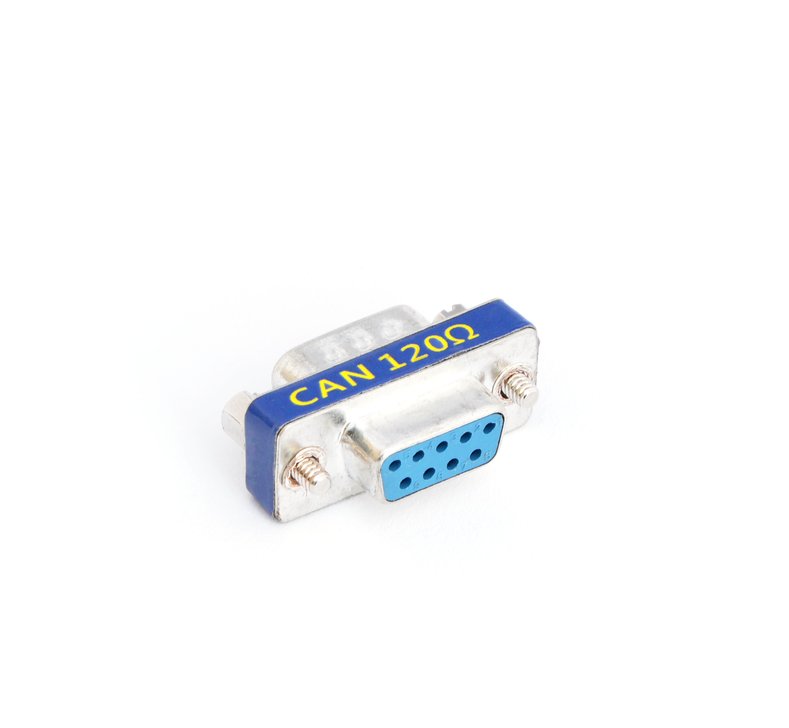
 TERMINATION
TERMINATION
120 ohm terminal resistors are great for e.g. test setups
 CAN/CAN FD
CAN/CAN FD
Supports regular high speed ISO 11898-2 CAN and CAN FD
 SOLID LOCKS
SOLID LOCKS
DB9 screw locks ensure a solid connection
 COMPACT
COMPACT
The termination adapter is extremely compact
 STANDARD DB9
STANDARD DB9
Works with most CAN adapters (CiA 303-1 compatible DB9 pins)
 1Y WARRANTY
1Y WARRANTY
We offer a 1-year warranty on all our products
About terminal resistors
A CAN bus terminator can be used for termination of any high speed (ISO 11898-2) CAN bus system. The 120 Ohm terminating resistor is setup between pin 2 (CAN low) and pin 7 (CAN high). In general, ISO 11898-2 CAN networks must be terminated at each end using 120 Ohm terminal resistors.
Terminal resistors are often required in test setups when CAN nodes have no existing termination. In contrast, most vehicle CAN buses are already terminated properly.


What role does CAN bus termination play?
Terminal resistors are needed in CAN bus systems because CAN communication flows are two-way. The termination at each end absorbs the CAN signal energy, ensuring that this is not reflected from the cable ends. Such reflections would cause interference and potentially damaged signals.
The reflection challenge grows with the length of the cables as well as the CAN bus bit rate. This is why it is critical to add proper termination in larger CAN networks.
For best results, the CAN bus termination should match the nominal impedance of the cables, which for ISO 11898-2 (high speed CAN) is specified at 120 Ohm. Hence 120 Ohm termination adaptors are considered the standard for CAN bus.
Check out our FAQ - or buy now!
Do you have any questions?
Contact us| GENERAL | |
|---|---|
| Compatibility | High Speed CAN Bus (ISO 11898-2) incl. CAN FD, SAE J1939, OBD2, NMEA, CANopen |
| Connector | Male / Female DB9 (D-sub 9 pin) |
| Temperature | Operating temperature: -20degC to +80degC |
| Pin-out | In accordance with CiA 303-1 (matching our other devices/accessories) |
Adapter pinout
| DB9 (female) | Function | DB9 (male) |
| 1 | 1 | |
| 2 | 120 ohm to pin 7 | 2 |
| 3 | 3 | |
| 4 | 5 | |
| 5 | 5 | |
| 6 | 6 | |
| 7 | 120 ohm to pin 2 | 7 |
| 8 | 8 | |
| 9 | 9 |
Not necessarily. For very small CAN wire systems, you can typically do with just a single 120 Ohm termination adaptor. This is sometimes seen in e.g. test setups with one or a few CAN nodes. Note, however, that you cannot do without a termination adaptor in high speed (ISO 11898-2) CAN bus systems.
For larger CAN bus systems, you'll quickly run into "reflection" issues, while on short CAN bus cables you may not notice in practice any difference. Either way, it is strongly recommended to use 2 x 120 Ohm terminal resistors for larger CAN bus systems.
You can encounter "reflections", which in practical terms can lead to damaged data and hence incorrect interpretation of your output - or worse, inadequate reactions from vital CAN nodes in the system
Not if you use two 120 Ohm CAN bus terminators, one at each end. This assures a 60 Ohm load, which will secure the adequate recessive level regardless of the number of CAN nodes.
Yes, the CAN bus terminator can be used in any high speed CAN bus application, including applications based on J1939, CANopen, FMS, NMEA 2000 etc.
Yes, you can measure the resistance between the CAN High and CAN Low when the CAN bus system is powered down. If properly terminated at both ends, the resistance should be around 60 Ohm.